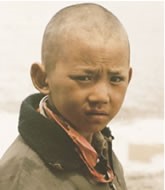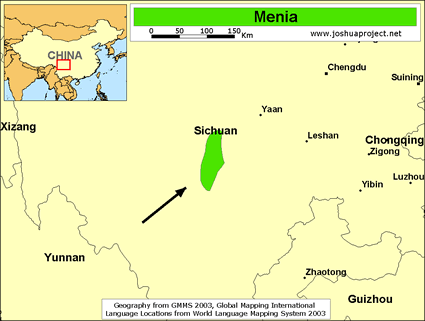Although they are now officially included under the Tibetan nationality, the Menia formerly belonged to the Chrame group who are commonly called Xifan (Western Barbarians) by the Chinese. Other tribes or subgroups of the Chrame include the Manyak and Hor.
From the Menia's language it appears that they can trace their ancestry to the Qiang people who roamed northwest China in former times. Over the course of many centuries the various tribes became dispersed across the vast geographical area of Sichuan and surrounding provinces. Some groups have been completely assimilated by the Tibetans or by the Chinese. Others, including the Menia, still retain their original language but have ceased to be culturally different from the surrounding peoples.
When, in the 1920s, a Western explorer visited the region inhabited by the Menia, he wrote, "We pitched camp on the banks of the Muli River, 8,000 feet above the sea, and here we made our first acquaintance with Muli villagers, especially the women, who barter grass and barley for the horses of caravans. Their dress consisted of dark-gray woolen skirts with fringes, and leather jackets. Their wealth of hair, a good deal of it false, was decorated with garlands of gilded Szechwan [Sichuan] rupees, a coin common in this region."
The Menia were once controlled by the Chrame king, who was also the head lama of the Muli Monastery. Tibetan Buddhism still pervades every aspect of Menia society.
There has never been a known Christian among the Menia. This is the tragic result of never having heard the gospel throughout their long history. Although they may show some interest in Christ, Buddhists do not believe in a God or a creator and do not view sin as an act of the will, but rather an external influence. These beliefs have created additional barriers to the gospel's advance.
The Menia need to meet a different kind of teacher than the ones they already know.
Pray for good storytellers who can bring the Menia stories of Jesus.
Pray for signs and wonders to happen among them and for great breakthroughs with a rapid multiplication of disciples and house churches.
Pray for bold workers who are driven by the love of the Holy Spirit to go to them.
Pray for an unstoppable movement to Christ among them.
Scripture Prayers for the Menia in China.
Operation China. Used by permission.
| Profile Source: Joshua Project |











